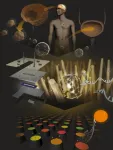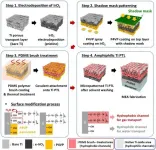New invention keeps qubits of light stable at room temperature
Researchers from University of Copenhagen have developed a new technique that keeps quantum bits of light stable at room temperature instead of only working at -270 degrees. Their discovery saves power and money and is a breakthrough in quantum research.
2021-06-17
(Press-News.org) As almost all our private information is digitalized, it is increasingly important that we find ways to protect our data and ourselves from being hacked.
Quantum Cryptography is the researchers' answer to this problem, and more specifically a certain kind of qubit - consisting of single photons: particles of light.
Single photons or qubits of light, as they are also called, are extremely difficult to hack.
However, in order for these qubits of light to be stable and work properly they need to be stored at temperatures close to absolute zero - that is minus 270 C - something that requires huge amounts of power and resources.
Yet in a recently published study, researchers from University of Copenhagen, demonstrate a new way to store these qubits at room temperature for a hundred times longer than ever shown before.
"We have developed a special coating for our memory chips that helps the quantum bits of light to be identical and stable while being in room temperature. In addition, our new method enables us to store the qubits for a much longer time, which is milliseconds instead of microseconds - something that has not been possible before. We are really excited about it," says Eugene Simon Polzik, professor in quantum optics at the Niels Bohr Institute.
The special coating of the memory chips makes it much easier to store the qubits of light without big freezers, which are troublesome to operate and require a lot of power.
Therefore, the new invention will be cheaper and more compatible with the demands of the industry in the future.
"The advantage of storing these qubits at room temperature is that it does not require liquid helium or complex laser-systems for cooling. Also it is a much more simple technology that can be implemented more easily in a future quantum internet," says Karsten Dideriksen, a UCPH-PhD on the project.
A special coating keeps the qubits stable
Normally warm temperatures disturb the energy of each quantum bit of light.
"In our memory chips, thousands of atoms are flying around emitting photons also known as qubits of light. When the atoms are exposed to heat, they start moving faster and collide with one another and with the walls of the chip. This leads them to emit photons that are very different from each other. But we need them to be exactly the same in order to use them for safe communication in the future," explains Eugene Polzik and adds:
"That is why we have developed a method that protects the atomic memory with the special coating for the inside of the memory chips. The coating consists of paraffin that has a wax like structure and it works by softening the collision of the atoms, making the emitted photons or qubits identical and stable. Also we used special filters to make sure that only identical photons were extracted from the memory chips".
Even though the new discovery is a breakthrough in quantum research, it stills needs more work.
"Right now we produce the qubits of light at a low rate - one photon per second, while cooled systems can produce millions in the same amount of time. But we believe there are important advantages to this new technology and that we can overcome this challenge in time," Eugene concludes.
INFORMATION:
ELSE PRESS RELEASES FROM THIS DATE:
2021-06-17
AI is used in an array of extremely useful applications, such as predicting a machine's lifetime through its vibrations, monitoring the cardiac activity of patients and incorporating facial recognition capabilities into video surveillance systems. The downside is that AI-based technology generally requires a lot of power and, in most cases, must be permanently connected to the cloud, raising issues related to data protection, IT security and energy use.
CSEM engineers may have found a way to get around those issues, thanks to a new system-on-chip they have developed. It runs on a tiny ...
2021-06-17
Bottom Line: Genetic mutations indicative of DNA damage were associated with high red meat consumption and increased cancer-related mortality in patients with colorectal cancer.
Journal in Which the Study was Published: Cancer Discovery, a journal of the American Association for Cancer Research
Author: Marios Giannakis, MD, PhD, an assistant professor of medicine at Harvard Medical School and a physician at Dana-Farber Cancer Institute
Background: "We have known for some time that consumption of processed meat and red meat is a risk factor for colorectal cancer," ...
2021-06-17
The unique mechanical and optical properties found in the exoskeleton of a humble Asian beetle has the potential to offer a fascinating new insight into how to develop new, effective bio-inspired technologies.
Pioneering new research by a team of international scientists, including Professor Pete Vukusic from the University of Exeter, has revealed a distinctive, and previously unknown property within the carapace of the flower beetle - a member of the scarab beetle family.
The study showed that the beetle has small micropillars within the carapace - or the upper section of the exoskeleton - that give the insect both strength and flexibility to withstand damage very effectively.
Crucially, these micropillars are incorporated into highly regular layering in the exoskeleton ...
2021-06-17
Sophia Antipolis - 17 June 2021: People living with obesity who attended a non-judgemental and personalised lifestyle modification programme improved their cardiovascular and mental health during just 10 weeks, according to a study presented today at EuroHeartCare - ACNAP Congress 2021, an online scientific congress of the European Society of Cardiology (ESC).1 Participants lost weight and achieved benefits in anxiety and depression and physical measurements including blood pressure.
"We focus on changing behaviours and improving people's relationship with food," said study ...
2021-06-17
The fast-food industry spent $5 billion on advertising in 2019, and the advertisements disproportionately targeted Black and Hispanic youth, according to new research published today by the Rudd Center for Food Policy and Obesity at the University of Connecticut. The new report, Fast Food FACTS 2021, finds that the industry's annual ad spending in 2019 increased by over $400 million since 2012, and that children and teens were viewing on average more than two fast food TV ads per day.
Frequent and widespread exposure to fast-food marketing increases young people's preferences for, and consumption ...
2021-06-17
ANN ARBOR, Mich. - The price tag for giving birth in America may bring some families sticker shock - even for those with private insurance.
And when delivering moms require caesarians or their newborns need neonatal care, some families may spend as much as $10,000 out-of-pocket, according to a new Michigan Medicine-led study.
"Childbirth is the most common reason for hospitalization in the U.S.," said lead author Kao-Ping Chua, M.D., Ph.D.,a pediatrician and researcher at University of Michigan Health C.S. Mott Children's Hospital and the Susan B. Meister Child Health Evaluation and Research Center.
"Our findings show that some privately insured families are shouldering ...
2021-06-17
A recent study by Nagoya University researchers revealed that microRNAs in urine could be a promising biomarker to diagnose brain tumors. Their findings, published in the journal ACS Applied Materials & Interfaces, have indicated that regular urine tests could help early detection and treatment of brain tumors, possibly leading to improved patient survival.
Early diagnosis of brain tumors is often difficult, partly because most people undergo a brain CT or MRI scan only after the onset of neurological deficits, such as immobility of limbs, and incapability of speech. When brain tumors are detected by CT or MRI, in many cases, they have already grown too large to be fully removed, which could lower patients' survival rate. From this perspective, accurate, easy, and inexpensive ...
2021-06-17
Green hydrogen, a source of clean energy that can be generated without using fossil fuels, has recently gained immense attention as it can be potentially used to promote carbon neutrality. Korean researchers have succeeded in improving the efficiency of unitized regenerative fuel cells that can be used to efficiently produce green hydrogen and generate power.
The unitized regenerative fuel cells boast of hydrogen production and fuel cell modes. They are eco-friendly, cost-effective, and independent energy storage and power generation devices that require less space for ...
2021-06-17
SPOKANE, Wash. - Many people likely lost sleep over COVID-19. A study of twins led by Washington State University researchers found that stress, anxiety and depression during the first few weeks of the pandemic were associated with less and lower quality sleep.
In a survey of more than 900 twins taken shortly after COVID-19 lockdown measures began, about half of the respondents reported no change in their sleep patterns, but around a third, 32.9%, reported decreased sleep. Another 29.8% reported sleeping more. In the analysis, the researchers found that any change in sleep was connected to self-reported mental health issues, though it was more strongly associated with decreased ...
2021-06-17
Ireland, June 17 2021: Popular video games have the potential to provide low-cost, easy access, effective and stigma-free support for some mental health issues, researchers at Lero, the Science Foundation Ireland Research Centre for Software, have found.
The team at Lero, a world leader in connected-health research, said video games could be used where conventional therapies are not available because of cost or location, or as an addition to traditional therapeutic treatments for depression or anxiety.
Lero researcher Dr Mark Campbell said there is mounting scientific ...
LAST 30 PRESS RELEASES:
[Press-News.org] New invention keeps qubits of light stable at room temperature
Researchers from University of Copenhagen have developed a new technique that keeps quantum bits of light stable at room temperature instead of only working at -270 degrees. Their discovery saves power and money and is a breakthrough in quantum research.

